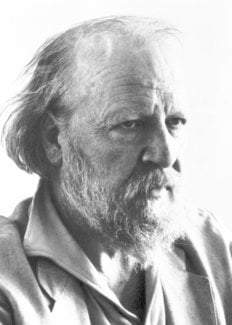William Golding
Biographical

William Golding was born in Cornwall in 1911 and was educated at Marlborough Grammar School and at Brasenose College, Oxford. Apart from writing, his past and present occupations include being a schoolmaster, a lecturer, an actor, a sailor, and a musician. His father was a schoolmaster and his mother was a suffragette. He was brought up to be a scientist, but revolted. After two years at Oxford he read English literature instead, and became devoted to Anglo-Saxon. He spent five years at Oxford. Published a volume of poems in 1935. Taught at Bishop Wordsworth’s School, Salisbury. Joined the Royal Navy in 1940 and spent six years afloat, except for seven months in New York and six months helping Lord Cherwell at the Naval Research Establishment. He saw action against battleships (at the sinking of the Bismarck), submarines and aircraft. Finished as Lieutenant in command of a rocket ship. He was present off the French coast for the D-Day invasion, and later at the island of Walcheren. After the war he returned to teaching, and began to write again. Lord of the Flies, his first novel, was published in 1954. It was filmed by Peter Brook in 1963. His other books are:
| The Inheritors (novel) 1955 |
| Pincher Martin (novel) 1956 |
| The Brass Butterfly (play) 1958 |
| Free Fall (novel) 1959 |
| The Spire (novel) 1964 |
| The Hot Gates (essays) 1965 |
| The Pyramid (novel) 1967 |
| The Scorpion God (three short novels) 1971 |
| Darkness Visible (novel) 1979 |
| Rites of Passage (novel) 1980 |
| A Moving Target (essays and autobiographical pieces) 1982 |
| The Paper Men (novel) 1984 |
| An Egyptian Journal 1985 |
| Close Quarters (novel) 1987 |
| Fire Down Below (novel) 1989 |
In 1980 he won the ‘Booker Prize’ for his novel Rites of Passage. He retired from teaching in 1962. After that, he lived in Wiltshire, listing his recreations as music, sailing, archaeology and classical Greek.
William Golding died in 1993.
This autobiography/biography was written at the time of the award and first published in the book series Les Prix Nobel. It was later edited and republished in Nobel Lectures. To cite this document, always state the source as shown above.
William Golding died on June 19, 1993.
Nobel Prizes and laureates
Six prizes were awarded for achievements that have conferred the greatest benefit to humankind. The 12 laureates' work and discoveries range from proteins' structures and machine learning to fighting for a world free of nuclear weapons.
See them all presented here.
